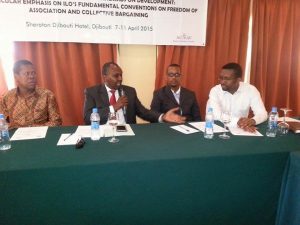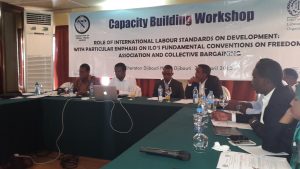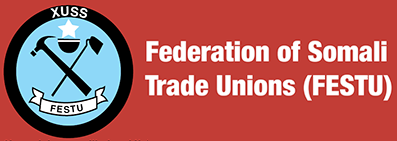 The Federation of Somali Trade Unions (FESTU) in partnership with the International Labour Organisation (ILO) concluded a 2-day national capacity building workshop on role of international labour standards on development with particular emphasis on ILO’s fundamental conventions on freedom of association and collective bargaining.
The Federation of Somali Trade Unions (FESTU) in partnership with the International Labour Organisation (ILO) concluded a 2-day national capacity building workshop on role of international labour standards on development with particular emphasis on ILO’s fundamental conventions on freedom of association and collective bargaining.
With the support of ILO’s Bureau for Workers’ Activities (ACTRAV) Norway Project, entitled “Trade Unions for Social Justice”, the national workshop was held at Sheraton Hotel in Djibouti on 8-9 April 2015, with attendance of fifteen (15) trade union leaders and activists from 10 sectoral trade unions affiliated with FESTU. Trade union representatives came from Somalia’s main towns namely Mogadishu, Baidoa, Beledweyne, Jowhar, Bossasso, Kismayo, Galkayo and Garowe.
During the 2 days capacity building activity, the workshop covered overview of the  International Labour Organization and its international labour standards system; ILO fundamental Conventions on freedom of association and collective bargaining; national situation and labour law on freedom of association and collective bargaining; major issues and challenges for the national application of freedom of association and collective bargaining standards and principles; different situations in Somali regions on enjoyment of freedom of association; and ways and means to improve the current national situation.
International Labour Organization and its international labour standards system; ILO fundamental Conventions on freedom of association and collective bargaining; national situation and labour law on freedom of association and collective bargaining; major issues and challenges for the national application of freedom of association and collective bargaining standards and principles; different situations in Somali regions on enjoyment of freedom of association; and ways and means to improve the current national situation.
Mr Ahmed Osman Said, President of FESTU, welcomed all participants and briefly introduced the workshop. He stated that the aim of the workshop is to strengthen Somali trade unions’ understanding of the content and scope of international standards and principles on freedom of association and collective bargaining, thereby generating a national trade union consciousness and response on the key issues and challenges relating to their promotion and application at the national level as well as on strategies to address them.
Introductory remarks were given by Mr Omar Faruk Osman, General Secretary of FESTU, by expressing his appreciation for the ILO-ACTRAV in supporting workshop on this timely and important topic, and for the opportunity for Somali trade unions and their leaders to come together to discuss freedom of association and the right to collectively bargain, which is a fundamental human right exercisable at the workplace and in labour unions. He mentioned that freedom of association and collective bargaining are the basis of fundamental and democratic rights of Somali workers, and there will be no social peace and development without these democratic rights. This in his view made freedom of association and collective bargaining part and parcel of democratic labour market governance.
 Dr Mohammed Mwamadzingo, Africa Regional Desk Office of ILO-ACTRAV, gave an overview of the project and what the workshop intended to achieve. He stated that Freedom of Association is the cornerstone of the ILO’s approach to decent work and national development. He highlighted the importance of freedom of association, as a fundamental right that is an enabling mechanism with the potential to foster and support economic and social development. He noted that the workshop is a confirmation of ILO’s support to FESTU in its efforts to promote and protect fundamental principles and rights at work, including the principles of freedom of association and collective bargaining.
Dr Mohammed Mwamadzingo, Africa Regional Desk Office of ILO-ACTRAV, gave an overview of the project and what the workshop intended to achieve. He stated that Freedom of Association is the cornerstone of the ILO’s approach to decent work and national development. He highlighted the importance of freedom of association, as a fundamental right that is an enabling mechanism with the potential to foster and support economic and social development. He noted that the workshop is a confirmation of ILO’s support to FESTU in its efforts to promote and protect fundamental principles and rights at work, including the principles of freedom of association and collective bargaining.
H.E. Abdi Hussein Ahmed, Minister of Labour & Administrative Reform of Republic of Djibouti, officially opened the workshop by expressing his sincere appreciation to the ILO for supporting FESTU leaders workshop, as a means of educating Somali trade union leaders the importance of freedom of association and collective bargaining at the workplace. He specified Djibouti government’s decision to provide space and support for Somali trade unions to be capacitated and educated in Djibouti. The Minister noted that freedom of association and collective bargaining play a significant role in improving terms and conditions of employment.
The Minister of Labour & Administrative Reform added that negotiations and round table discussions are the best options to address workplace disputes between trade unions and employers. He said that some of the challenges for effective social dialogue and negotiations are lack of capacity and expertise of social partners; weak cooperation and partnership and also resource constraints.
Somalia is a Member of the ILO and has ratified the two ILO fundamental Conventions concerning freedom of association and collective bargaining, i.e. Conventions Nos. 87 and 98 on 20 March 2014, following rigorous ratification campaign by FESTU.
